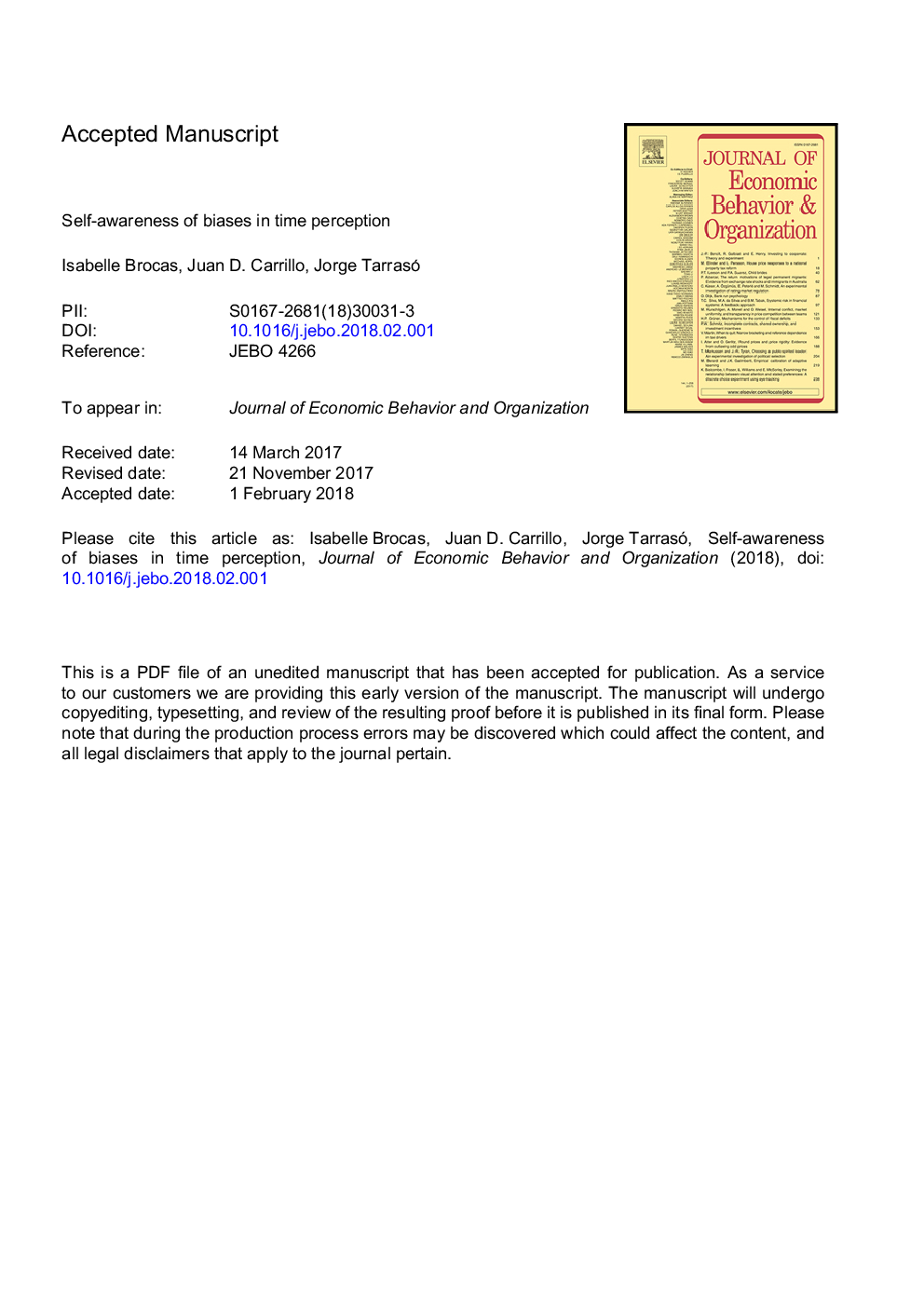| کد مقاله | کد نشریه | سال انتشار | مقاله انگلیسی | نسخه تمام متن |
|---|---|---|---|---|
| 7242604 | 1471619 | 2018 | 38 صفحه PDF | دانلود رایگان |
عنوان انگلیسی مقاله ISI
Self-awareness of biases in time perception
ترجمه فارسی عنوان
خود آگاهی از تعصبات در ادراک زمان
دانلود مقاله + سفارش ترجمه
دانلود مقاله ISI انگلیسی
رایگان برای ایرانیان
کلمات کلیدی
ترجمه چکیده
ما خودآگاه در ادراک زمان با استفاده از سه وظیفه تولید زمان با ساختار پاداش های مختلف، و خود ارزیابی عملکرد را جمع آوری کردیم. شرکت کنندگان مشوق های پولی برای هدف قرار دادن زمان واقعی در اولین وظیفه (ابتدایی) داشتند تا از زمان واقعی در کار دوم فراتر نروند و نه کمتر از زمان واقعی در کار سوم. ما متوجه شدیم که شرکت کنندگان در تمام وظایف زمان بیشینه را برآورده می کنند، اما به درستی به انگیزه پاسخ دادند: تخمین های خود را در کار دوم کاهش داده و آنها را در سومین بار افزایش داد. خود ارزیابی شرکت کنندگان در وظیفه پایه مطابق با تعصبات درک زمان خود بود و رفتار آنها در سایر وظایف مطابق با باورهای آنها بود. برآوردهای بیش از حد خود درک شده تخمین های خود را در کار دوم کاهش قابل توجهی نسبت به برآوردگرهای خود درک نداشتند، در حالی که در وظیفه سوم، برآوردهای آنها به طور قابل توجهی کمتر بود. آخر، ما تأثیر استرس فیزیولوژیکی را با داشتن نیمی از جمعیت ما انجام دادیم تا فشار سرد را کامل کنیم و اثرات قابل توجهی نداشته باشیم.
موضوعات مرتبط
علوم انسانی و اجتماعی
اقتصاد، اقتصادسنجی و امور مالی
اقتصاد و اقتصادسنجی
چکیده انگلیسی
We investigated self-awareness in time perception using three time production tasks with different reward structures, and collected self-assessments of performance. Participants had monetary incentives to target the true time in the first (baseline) task, not to exceed the true time in the second task and not to fall below the true time in the third task. We found that participants overestimated time in all tasks but responded correctly to incentives: they decreased their estimates in the second task and increased them in the third. Participants' self-assessment in the baseline task was in line with their time perception biases, and their behavior in the other tasks was consistent with their (correct) beliefs. Self-perceived over-estimators decreased their estimates in the second task significantly more relative to self-perceived under-estimators, while in the third task they increased their estimates significantly less. Last, we explored the effect of physiological stress by having half of our population complete the Cold Pressure Task and found no significant effect.
ناشر
Database: Elsevier - ScienceDirect (ساینس دایرکت)
Journal: Journal of Economic Behavior & Organization - Volume 148, April 2018, Pages 1-19
Journal: Journal of Economic Behavior & Organization - Volume 148, April 2018, Pages 1-19
نویسندگان
Isabelle Brocas, Juan D. Carrillo, Jorge Tarrasó,
